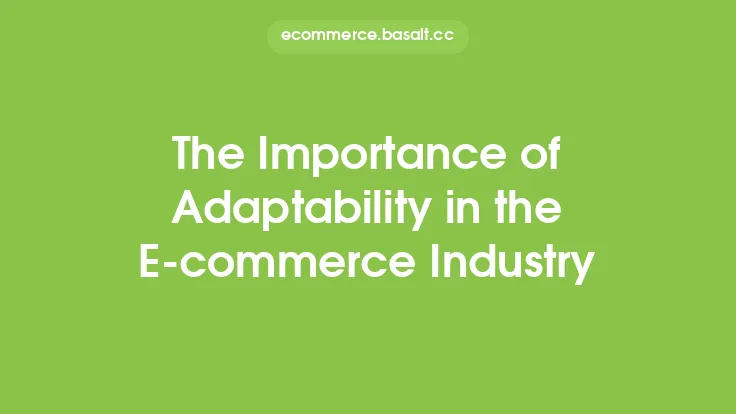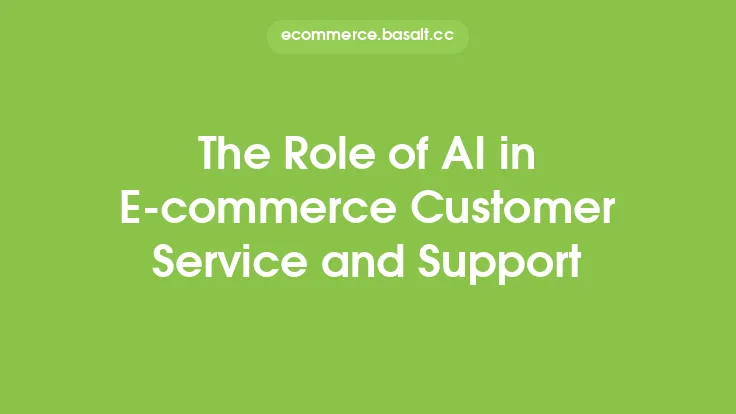The e-commerce industry has undergone a significant transformation over the years, and technology has played a pivotal role in shaping its growth and development. From the early days of online shopping to the current era of mobile commerce and social media integration, technology has been the driving force behind the evolution of e-commerce. In this article, we will explore the role of technology in shaping the e-commerce industry, highlighting its impact on various aspects of online retail, including customer experience, supply chain management, payment systems, and marketing strategies.
Introduction to E-commerce Technology
E-commerce technology refers to the use of digital tools and platforms to facilitate online transactions, manage inventory, and provide customer support. The advent of e-commerce technology has enabled businesses to reach a wider audience, increase sales, and improve customer satisfaction. Some of the key technologies that have contributed to the growth of e-commerce include electronic payment systems, inventory management software, and digital marketing platforms. These technologies have not only simplified the online shopping experience but also provided businesses with valuable insights into customer behavior and preferences.
Impact on Customer Experience
Technology has revolutionized the customer experience in e-commerce, providing shoppers with a seamless and personalized online shopping experience. Some of the key technologies that have improved customer experience include responsive web design, mobile apps, and artificial intelligence-powered chatbots. Responsive web design enables websites to adapt to different screen sizes and devices, ensuring that customers can shop easily from their smartphones, tablets, or desktops. Mobile apps, on the other hand, provide customers with a convenient and user-friendly way to shop on-the-go. Artificial intelligence-powered chatbots have also become increasingly popular, providing customers with instant support and personalized recommendations.
Supply Chain Management and Logistics
Technology has also had a significant impact on supply chain management and logistics in e-commerce. The use of inventory management software, for example, enables businesses to track their stock levels, manage orders, and optimize their supply chain operations. This not only improves efficiency but also reduces costs and minimizes the risk of stockouts or overstocking. Additionally, the use of data analytics and machine learning algorithms enables businesses to predict demand, optimize their pricing strategies, and improve their overall supply chain operations.
Payment Systems and Security
Payment systems and security are critical components of e-commerce, and technology has played a vital role in ensuring secure and convenient transactions. The use of electronic payment systems, such as credit cards, PayPal, and mobile wallets, has simplified the online payment process, reducing the risk of fraud and improving customer trust. Additionally, the use of encryption technologies, such as SSL and TLS, ensures that customer data is protected and secure. The implementation of two-factor authentication and other security measures has also improved the security of online transactions, reducing the risk of hacking and cyber attacks.
Marketing Strategies and Social Media Integration
Technology has also transformed the way businesses market and promote their products online. The use of digital marketing platforms, such as social media, email marketing, and search engine optimization, enables businesses to reach a wider audience, increase brand awareness, and drive sales. Social media integration, in particular, has become a critical component of e-commerce marketing, enabling businesses to engage with customers, share product information, and promote their brand. The use of influencer marketing, user-generated content, and social media advertising has also become increasingly popular, providing businesses with new and innovative ways to reach their target audience.
Future of E-commerce Technology
The future of e-commerce technology is exciting and rapidly evolving. Some of the emerging trends and technologies that are expected to shape the industry include augmented reality, virtual reality, and the Internet of Things (IoT). Augmented reality, for example, enables customers to visualize products in 3D, improving the online shopping experience and reducing the risk of returns. Virtual reality, on the other hand, provides customers with a fully immersive shopping experience, enabling them to interact with products in a virtual environment. The IoT is also expected to play a significant role in e-commerce, enabling businesses to connect with customers through smart devices and provide personalized recommendations and offers.
Conclusion
In conclusion, technology has played a vital role in shaping the e-commerce industry, transforming the way businesses operate, market, and interact with customers. From electronic payment systems and inventory management software to digital marketing platforms and social media integration, technology has improved the customer experience, simplified supply chain operations, and provided businesses with valuable insights into customer behavior and preferences. As the industry continues to evolve, it is likely that emerging trends and technologies, such as augmented reality, virtual reality, and the IoT, will play an increasingly important role in shaping the future of e-commerce.





